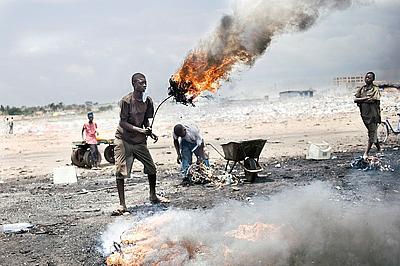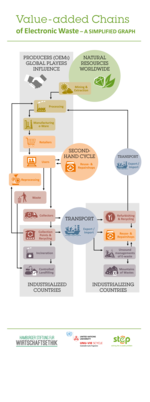Ethical Risk Assessment Electrorecycling
The quantity of waste electronic equipment exported from Germany to African and Asian markets rises annually with an estimated total of 155,000 tons in 2008. As the predominant share of the goods is being exported illegally, the ever growing quantity gives cause to concern.
This era-paper (era = ethical risk assessment) sheds a light on the value chain of electronic recycling including all its socio-ethic and ecological shortcomings. Through a policy analysis, reasons for the gap between an elaborated, compulsory set of rules and its poor practical implementation will be identified in this paper. Apart from evident internal weaknesses of controlling and sanctioning instances, reasons widely go beyond the hold of the often criticized responsible bodies which have to deal with very limited capacities in terms of workforce and resources.
The analysis shows that wrong incentives pose a driving factor as they make it economically profitable to bypass existing rules and exploit obvious legal limbos. This is particularly the case with extra-European trade with waste electronic equipment where the boundaries between legality and illegality and hence between legitimate export of second-hand goods and illegal trade with electronic waste equipment are owing – resulting in an ongoing infiltration of the latter. In order to increase the efficiency of existing rule systems and set starting points for societal processes of change aiming at reducing socio-ethic and ecological risks, the survey identifies first measures as a recommendation. These entail raising the awareness among customers with improved systems of recycling, enhanced transparency in terms of market actors’ business activities but also a revision of structures especially where the legal frame is contradicted and therefore in danger to be bypassed.







![era-paper Electrorecycling [Translate to Englisch:] era-paper Elektrorecycling](/fileadmin/_processed_/8/c/csm_ERA_01_DIGITALVERSION_final_bf33864ffa.png)

